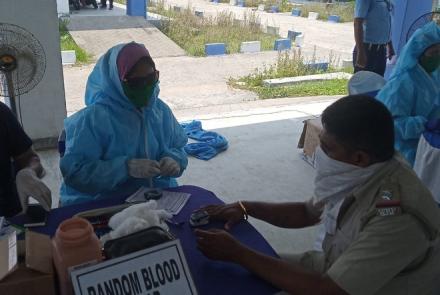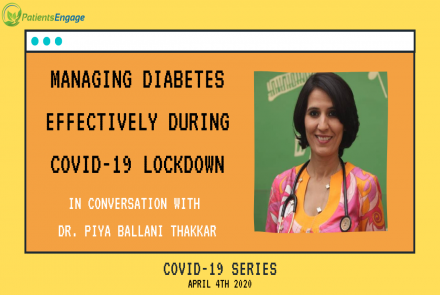
People with type 2 diabetes are at an increased risk of developing frozen shoulder, a sometimes severely painful condition in which there is reduced mobility of the shoulders, says Dr Girish Parmar, Consultant Endocrinologist, Nanavati Super Speciality Hospital.
Is there a link between diabetes and muscle joint disorders?
Yes there is a link between diabetes and musculoskeletal system. Diabetes is a metabolic disorder wherein the extra glucose in circulation sticks to the tissues. Therefore in long standing diabetes, not only the blood vessels of the muscles are blocked but also the glucose sticks to the joint capsules and limits the movements at the joint
Are people with diabetes more likely to get frozen shoulder than those with normal sugar? What is the prevalence of the disease among diabetics?
Yes people with diabetes are more likely to get frozen shoulder than the general population. The lifetime prevalence of frozen shoulder in the general population is 2-5% whereas in persons with diabetes it is 10-20%. Those with Type 1 diabetes have more frequent and more prolonged course as compared to those with Type 2 diabetes.
How common is frozen shoulder compared to other complications of diabetes?
In comparison to microvascular complications of diabetes like peripheral neuropathy which happens in 50-60% of those with diabetes, frozen shoulder is less common. However the occurrence of frozen shoulder is similar to microvascular complications like nephropathy and retinopathy!
How does a shoulder become frozen?
The exact pathophysiology of frozen shoulder is not clear. Based on arthroscopic findings, it is proposed that inflammation in the joint capsule occurs initially followed by adhesions and fibrosis of the synovial lining. However, some researchers believe that it is a primary fibrosing condition and not inflammatory.
What are the signs and symptoms of a frozen shoulder?
Frozen shoulder usually progresses through three phases:
- Initial phase of intense, diffuse and disabling shoulder pain at night associated with increasing stiffness that last for two to nine months
- Intermediate of stiffness and severe restriction in shoulder movements with pain progressively reducing lasting for four to twelve months
- Recovery phase with gradual return of range of motion which may take five to twenty four months to complete
Why are women affected more than men by frozen shoulder?
Not known
How is frozen shoulder diagnosed?
Clinically there is limitation and pain on movements at the glen humeral joint. Abduction and external rotation are the movements that are affected most. These patients often have difficulty in placing their hands on their back or buttock. Restriction of both active and passive movements is noted in these individuals.
Plain X-rays are usually normal and of limited diagnostic utility in patients with frozen shoulder. MRI studies may be useful in case of diagnostic dilemmas. It usually shows thickening of the joint capsule and coracohumeral ligament. In the hands of an expert sinologist an Musculoskeletal USG may also aid in establishing the diagnosis.
What are the different treatments for frozen shoulders?
Treatment options for frozen shoulder depend upon the severity of pain. One may consider active physiotherapy and pain relief medications in mild cases or intra-articular steroids and/or intra-articular hydro dilation in severe cases for pain relief.
How can one prevent getting a frozen shoulder?
Frozen shoulder can be idiopathic or secondary to certain disorders like diabetes, stroke, post prolonged immobilisation or shoulder injury. One can prevent frozen shoulder by daily gentle shoulder exercises and good metabolic control of diabetes if it pre-exists.
Check out the yoga for upper body in this eBook. You will need to register or login.
In which age group is frozen shoulder most likely to manifest itself?
Frozen Shoulder (adhesive capsulitis) usually occurs in the 4th and 5th decade of life. It is unlikely to occur before the 4th decade of life.
Are there any other shoulder disorders which persons with diabetes need to be wary about?
Persons with diabetes are more prone to develop adhesive capsulitis. Other shoulder pathologies like rotator cuff tendinopathy, sub acromial bursitis and impingement syndrome may mimic frozen shoulder. In most of these pathologies active movements are restricted and painful however passive movements are possible unlike frozen shoulder which limits both active and passive movements.
Related: Can there be other reasons for a painful shoulder - Physiotherapist Kalpana Kamdar answers. And tips on preventing shoulder issues.
Could you recommend some exercises for a frozen shoulder?
Gentle shoulder exercises are recommended in an individual with frozen shoulder. Initial exercises in early course should include gentle abduction, external rotation, internal rotation and combined abduction and external rotation. Once pain reduces then complex exercises like abduction-adduction with exercise band, flexion-extension with exercise band may be started under supervision. These exercises should be performed at least twice a week.
PatientsEngage found a couple of videos which explain the exercises in detail. Here are the links. Check with your doctor before you try these out and always warm the shoulder before doing the exercises
1. Frozen Shoulder Exercise Video - Dr. Brian
2. Frozen Shoulder Exercises and Stretches Video - Dr. Jo














